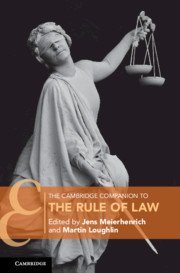Book contents
- The Cambridge Companion to the Rule of Law
- Cambridge Companions to Law
- The Cambridge Companion to the Rule of Law
- Copyright page
- Contents
- Contributors
- Part I Introduction
- Part II Histories
- 1 Classical Athens’ Radical Democratic “Rule of Law”
- 2 Rechtsstaat versus the Rule of Law
- 3 État de droit: The Gallicization of the Rechtsstaat
- 4 Islamic Conceptions of the Rule of Law
- 5 Empires and the Rule of Law: Arbitrary Justice and Imperial Legal Ordering
- Part III Moralities
- Part IV Pathologies
- Part V Trajectories
- Part VI Conclusion
- Bibliography
- Index
4 - Islamic Conceptions of the Rule of Law
from Part II - Histories
Published online by Cambridge University Press: 03 August 2021
- The Cambridge Companion to the Rule of Law
- Cambridge Companions to Law
- The Cambridge Companion to the Rule of Law
- Copyright page
- Contents
- Contributors
- Part I Introduction
- Part II Histories
- 1 Classical Athens’ Radical Democratic “Rule of Law”
- 2 Rechtsstaat versus the Rule of Law
- 3 État de droit: The Gallicization of the Rechtsstaat
- 4 Islamic Conceptions of the Rule of Law
- 5 Empires and the Rule of Law: Arbitrary Justice and Imperial Legal Ordering
- Part III Moralities
- Part IV Pathologies
- Part V Trajectories
- Part VI Conclusion
- Bibliography
- Index
Summary
To speak of “the rule of law” in many of the Muslim countries of the world at present may seem, not only to Westerners but to many citizens of the Islamic world, at best hypocritical and at worst a cruel joke. How, after all, can one speak of the rule of law when a woman may be killed for a marriage not approved by her father or brother, when a constitution can be changed at the whim of a ruler, or when corruption is so pervasive as to leave much of the citizenry feeling dirtied and disaffected? And yet the rule of law remains more than an ideal, more than a vague concept, and more than a useless analytic concept employed only by academic lawyers. For if we try to understand the rule of law not as a universal concept but for what it means in the context of any particular cultural tradition and its system of law, it may be possible to discern features that are not incompatible with the sense in which this phrase is commonly employed.
- Type
- Chapter
- Information
- The Cambridge Companion to the Rule of Law , pp. 86 - 100Publisher: Cambridge University PressPrint publication year: 2021
- 1
- Cited by

